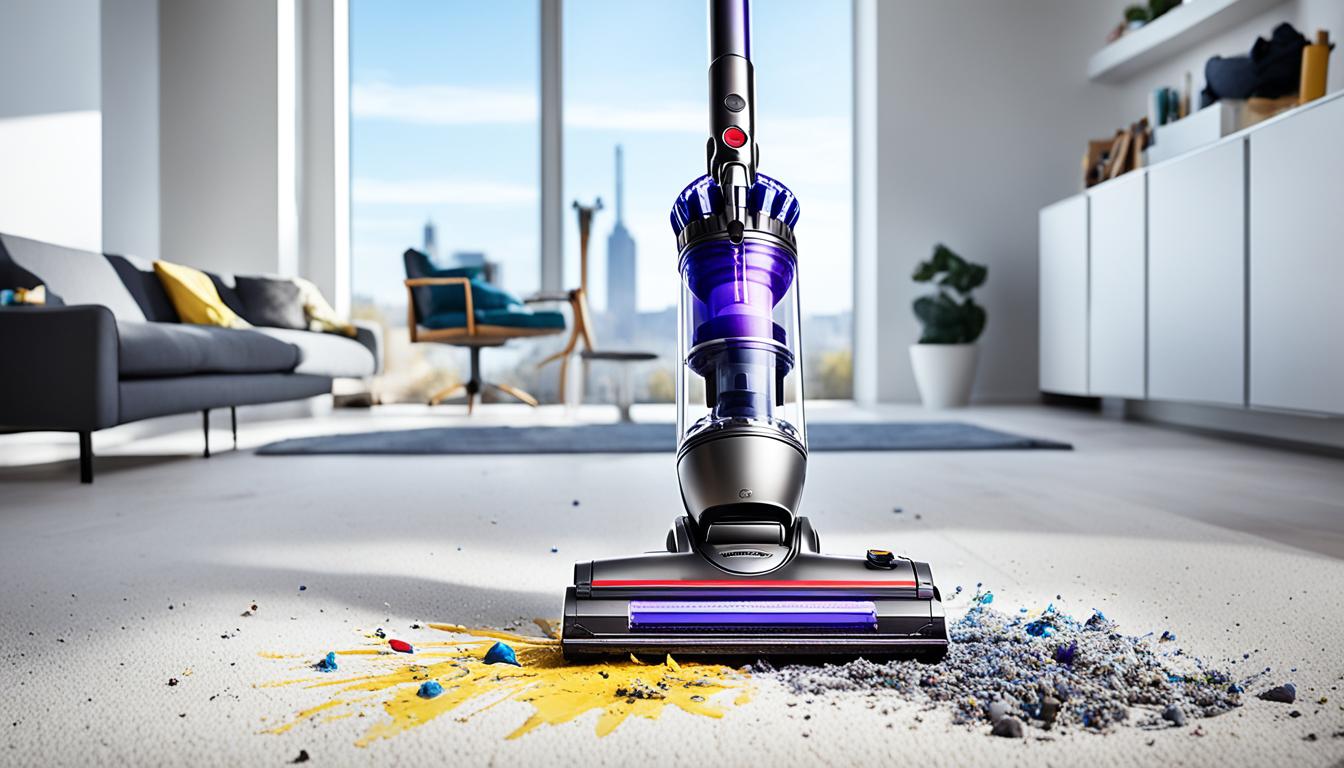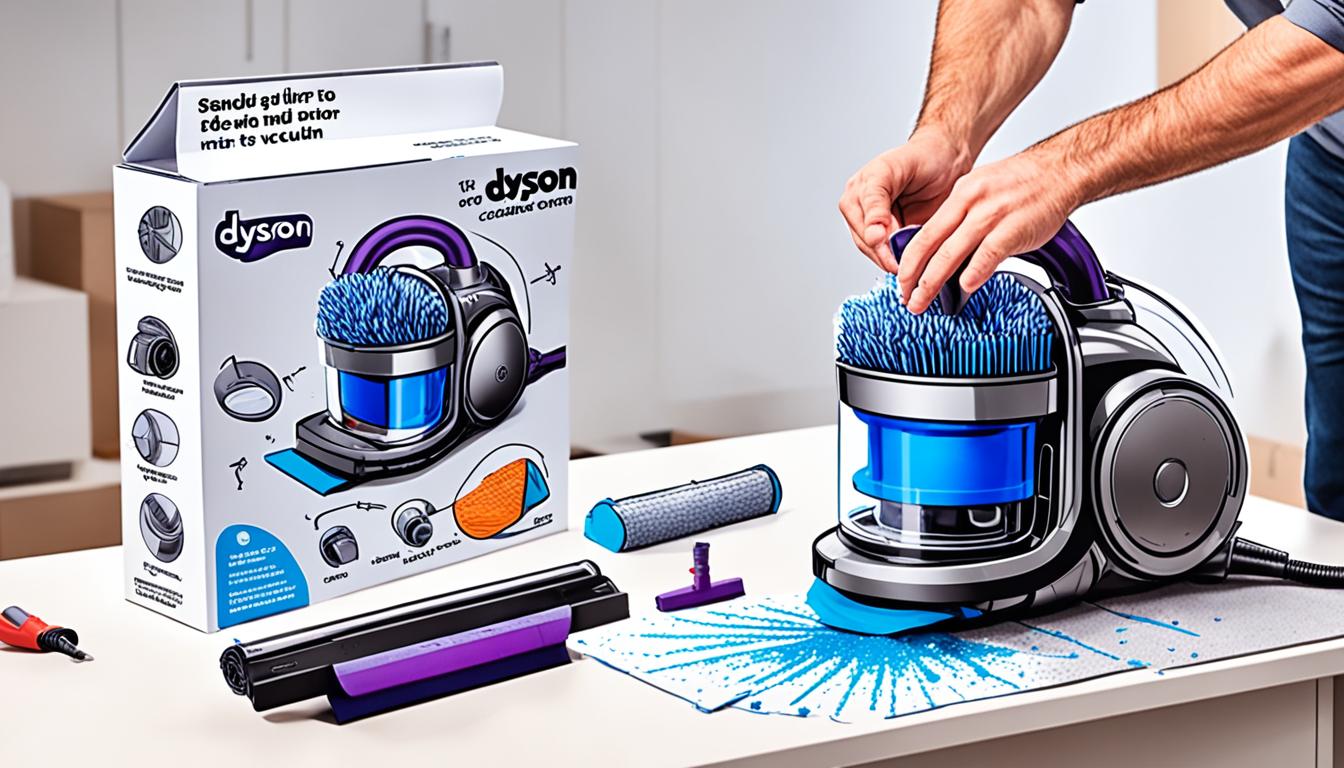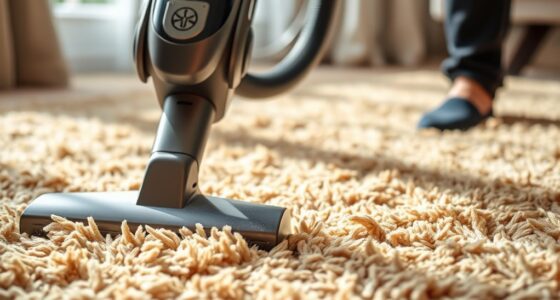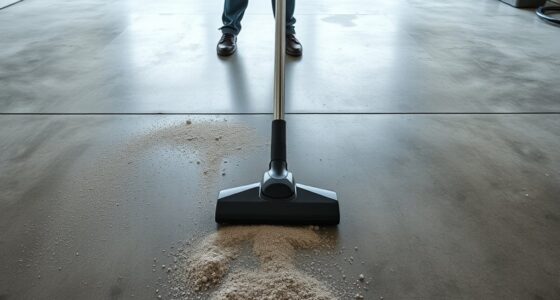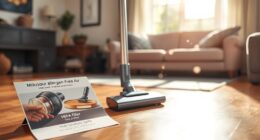Do you remember the feeling of anticipation when you finally invested in a high-quality vacuum cleaner? The excitement of bringing it home, unboxing it, and marveling at its sleek design and powerful suction? It’s a joyous moment that signals the beginning of a cleaner and healthier living space. But as time goes by, the wear and tear of daily use can start to take a toll on your beloved vacuum. And so, you wonder: how long do Dyson vacuums actually last?
Well, the answer is not a one-size-fits-all scenario. The lifespan of a Dyson vacuum can vary depending on several factors. According to statistical data1, Dyson vacuum cleaners are built to withstand the test of time. With proper care and maintenance, they can last between 8 to 12 years, providing efficient cleaning performance and reliable durability.
Even older models like the DC59 Animal Bagless Upright Vacuum Cleaner, released in 2009 and still available online, can continue to deliver exceptional results. This bagless upright vacuum features a brush bar for carpets, two wheels for easy movement, and a design that optimizes cleaning efficiency and convenience.
While Dyson vacuums might come at a higher price point compared to traditional models, they offer a range of features and benefits that justify the investment. Some models even come equipped with LCD screens to display cleaning progress, making your cleaning routine more interactive and engaging. Dyson vacuums also boast impressive suction power and streamlined designs, resulting in faster cleaning times and more efficient pet hair removal, making them a favorite among professional groomers.
In recent years, cordless Dyson vacuums have gained popularity due to advancements in technology. These cordless models provide easier maneuverability during cleaning sessions, allowing you to effortlessly reach every nook and cranny of your home. They offer the freedom to move around without being tethered to a power outlet, enhancing the overall cleaning experience.
It’s important to note that when choosing a Dyson vacuum, there are factors to consider such as the size of your home, the frequency of use, and the need for cordless functionality. These considerations will help you select the right Dyson model to meet your specific needs and ensure its longevity.
Key Takeaways:
- Dyson vacuums are designed to last between 8 to 12 years with proper care and maintenance1.
- The DC59 Animal Bagless Upright Vacuum Cleaner, released in 2009, is an example of a durable Dyson model that still delivers reliable performance1.
- Dyson vacuums are known for their fast cleaning times, impressive suction power, and pet hair removal capabilities1.
- Cordless Dyson vacuums have become increasingly popular for their maneuverability and convenience1.
- Factors to consider when choosing a Dyson vacuum include home size, frequency of use, and the need for cordless functionality1.
When it comes to investing in a vacuum cleaner, the longevity of your purchase is key. With Dyson, you can expect years of reliable performance, innovative features, and excellent cleaning results. So, say goodbye to inferior vacuums that break down after just a few years—opt for a Dyson and experience the difference.
Factors Affecting Vacuum Lifespan
Several factors can affect the lifespan of a vacuum cleaner. The brand and model of a vacuum play a significant role in determining its durability and longevity. Well-known and reputable brands such as Dyson, Shark, Bissell, and Hoover are often favored for their high-quality construction and superior craftsmanship2. However, regardless of the brand, proper maintenance is crucial for maximizing the lifespan of any vacuum.
Maintenance involves regular cleaning and filter replacement to ensure optimal performance and prevent premature wear and tear3. Simple habits like changing filters every 3 to 6 months can significantly extend a vacuum’s lifespan3. Additionally, the frequency and intensity of use, as well as the size and dirtiness of the cleaning area, can impact how long a vacuum will last. Vacuums used in large households with kids and pets may experience more wear and tear compared to those used in smaller households4.
Certain floor types can also influence a vacuum’s lifespan. Carpets, especially those with deep piles or high-traffic areas, can be more demanding on a vacuum than hard floors4. Regular maintenance and proper usage techniques are essential for ensuring the optimal performance and longevity of a vacuum cleaner. By adhering to these practices, you can prolong the lifespan of your vacuum and enjoy its benefits for years to come.
Factors Affecting Vacuum Lifespan:
- Brand and model
- Maintenance and cleaning
- Frequency and intensity of use
- Size and dirtiness of the cleaning area
- Type of flooring
Average Lifespan of Different Vacuum Types
| Vacuum Type | Average Lifespan |
|---|---|
| Upright Vacuums | At least 8 years2 |
| Canister Vacuums | 8 years or more2 |
| Stick Vacuums | 5 to 8 years2 |
| Handheld Vacuums | Approximately 5 to 8 years2 |
| Robot Vacuums | 3 to 5 years on average2 |
| Central Vacuum Systems | Up to 20 years2 |
| Backpack Vacuums | 5 to 8 years2 |
| Wet/Dry Shop Vacuums | Approximately a decade2 |
When choosing a vacuum, keep in mind the specific needs of your household and the durability of different brands. Vacuums from Shark, Bissell, Hoover, and Dyson are known for their longevity and durability with appropriate maintenance2. It’s also important to consider future lifestyle changes that may impact your vacuuming needs, such as moving to a larger space, acquiring pets, having kids, or needing to clean specific areas3. Upgrading to a new vacuum equipped with the necessary capabilities is often necessary to effectively meet these changing demands.
Technology advancements can also influence the lifespan of a vacuum. Newer models may offer improved efficiency and performance, prompting the need to upgrade from older models3. Mechanical issues like decreased suction power, clogs, loud noises, burning smells, or other irregularities can indicate that a vacuum is nearing the end of its lifespan3. Being aware of these signs can help you make an informed decision about when it’s time to replace your vacuum and invest in a more functional and reliable cleaning solution.
By understanding the factors that affect vacuum lifespan and taking the necessary steps to maintain and care for your vacuum, you can ensure that it operates optimally and lasts for many years. Regular cleaning and maintenance, along with selecting a vacuum that suits your needs and using it appropriately, will contribute significantly to its durability and longevity34.
Types of Vacuums and Their Lifespan
When it comes to choosing a vacuum cleaner, understanding the lifespan of each type is crucial in making an informed decision. Different vacuum types offer varying levels of durability and longevity. Let’s explore the lifespans of upright, canister, and stick vacuums.
Upright Vacuums
Upright vacuums are a popular choice for many households, known for their robust cleaning power and convenience. These vacuums typically have a lifespan of 5 to 10 years5. With regular maintenance and proper care, upright vacuums can endure everyday wear and tear, providing reliable cleaning performance for an extended period.
Canister Vacuums
Canister vacuums, with their versatile design and powerful suction, are renowned for their exceptional cleaning capabilities. These vacuums generally have a longer lifespan compared to upright models, lasting between 7 to 12 years5. Their durable build and advanced features contribute to their longevity, making canister vacuums an excellent investment for those seeking reliable cleaning solutions.
Stick Vacuums
Stick vacuums are lightweight and compact, offering the convenience of easy maneuverability and quick cleaning. While they may not have the same lifespan as upright or canister vacuums, stick vacuums still provide reliable performance for an average of 3 to 7 years5. Their portable and user-friendly nature makes them suitable for small spaces and quick clean-ups5.
Incorporating elements from the statistical data, it’s clear that the lifespan of vacuums can vary significantly depending on the type. Upright vacuums typically last 5 to 10 years5, while canister vacuums have a lifespan of 7 to 12 years5. Stick vacuums, on the other hand, offer an endurance of 3 to 7 years5. By selecting the right type of vacuum according to your cleaning needs and expectations, you can ensure the longevity of your cleaning companion.
| Vacuum Type | Lifespan |
|---|---|
| Upright | 5-10 years5 |
| Canister | 7-12 years5 |
| Stick | 3-7 years5 |
Signs it’s Time to Replace Your Vacuum
If you’ve had your vacuum cleaner for a while, it’s essential to be aware of the signs that indicate it may be time for a replacement. Over time, vacuum cleaners can wear out and become less effective, impacting their performance and ability to keep your home clean. Here are some indicators that it might be time to consider replacing your vacuum:
- Decreased Suction Power or Difficulty Starting: If you notice that your vacuum is no longer picking up dirt and debris as efficiently as it used to, or if it’s becoming challenging to start the vacuum, it could be a sign of worn-out internal components or motor issues6.
- Frequent Clogging: Even after performing small cleaning jobs, if you find that your vacuum frequently gets clogged, it may indicate a faulty filter or brush that needs replacement6.
- Loud Noises, Burning Smells, or Mechanical Issues: Unusual loud noises, burning smells, or mechanical problems like jammed brushes or broken belts are clear indications that your vacuum is experiencing significant issues and may need to be replaced6.
- Changing Cleaning Needs: If your cleaning requirements have evolved, such as the addition of pets to your household or transitioning to a different type of flooring, your current vacuum may no longer be suitable for those needs. Upgrading to a vacuum with specific features for pet hair removal or capable of handling various floor types can make a noticeable difference67.
- Outdated Technology: Vacuum cleaners have advanced significantly in recent years, offering more efficient and hassle-free cleaning solutions. If your vacuum is outdated and lacking modern features, upgrading to a newer model can enhance your cleaning experience6.
It’s important to note that before considering replacing your vacuum cleaner, troubleshooting common issues like clogged hoses, dirty filters, and worn drive belts can potentially extend its life and improve performance. Regular maintenance, such as cleaning or replacing filters and checking for obstructions, is also vital to keep your vacuum running optimally6.
Remember, the lifespan of a vacuum cleaner can vary depending on factors such as the brand, level of use, and maintenance. High-spec models like Dyson vacuums are known to have an average lifespan of around 10 years with proper care and maintenance7. However, most vacuum cleaners, according to studies, can last around eight years, while factors like heavy usage may require replacement after the eight-year mark8.
| Vacuum Lifespan | Consumer Reports (Average) | Link 2 (Dyson) | Link 3 (Overall) |
|---|---|---|---|
| High-end Models | – | Around 10 years7 | – |
| Most Vacuum Cleaners | Around 8 years68 | – | Average lifespan of 8 years8 |
When it comes to purchasing a new vacuum cleaner, the price range varies considerably, starting from approximately $150 and going up to $1,5008. The cost can depend on factors such as the brand, features, and technology. Robot vacuums, which have become more affordable in recent years, typically range between $350 and $1,500, while quality cordless models can cost between $300 and $7508.
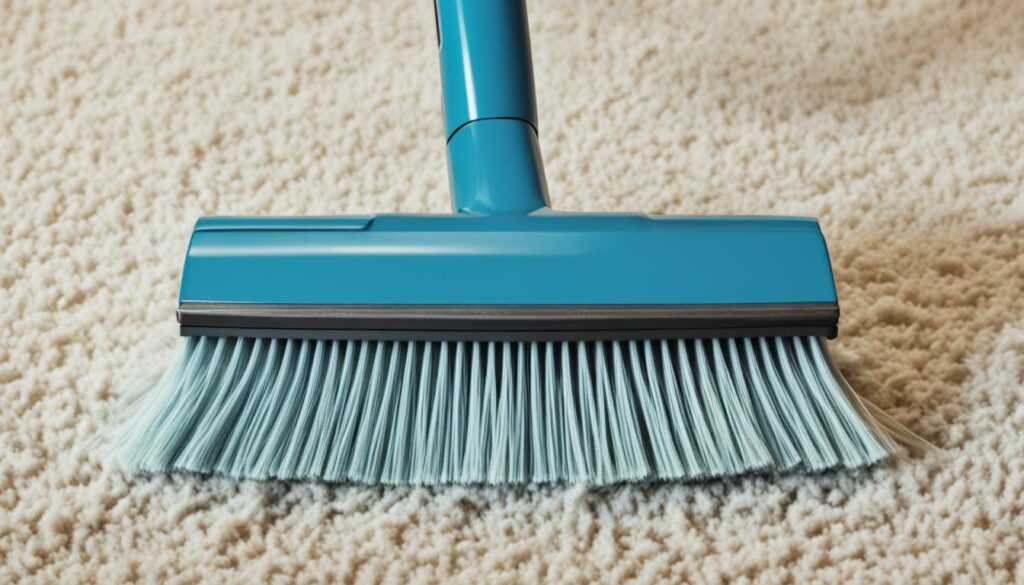
As you consider whether or not to replace your vacuum cleaner, evaluating its performance, age, and any changes in your cleaning needs can help you make an informed decision. Upgrading to a new vacuum that meets your requirements can improve the efficiency and effectiveness of your cleaning routine, ensuring a cleaner and healthier home environment.
Proper Maintenance for Vacuum Longevity
Proper maintenance is crucial to prolonging the lifespan of your vacuum cleaner and ensuring it performs optimally. By following these vacuum maintenance tips, you can extend the longevity of your vacuum and keep it in excellent working condition for years to come.
Cleaning and Replacing Filters Regularly
“An average vacuum cleaner should last between 5 and 7 years with proper maintenance”9.
One essential maintenance task is regularly cleaning and replacing the filters in your vacuum. Over time, filters can become clogged with dirt and debris, reducing suction power and overall performance. By cleaning or replacing filters as recommended by the manufacturer, you can maintain optimal airflow and suction, extending the life of your vacuum. Additionally, cleaning filters can prevent dust and allergens from recirculating into the air, improving the indoor air quality in your home.
Good Vacuuming Habits
Another important aspect of vacuum care is developing good cleaning habits. Avoid vacuuming up large or sharp objects that can damage the vacuum’s internal components. Empty the dust canister regularly, as a full canister can impede suction and strain the motor. Additionally, check for any clogs or blockages in the hose or brush roll and remove them promptly. Taking these preventive measures can prevent costly repairs and prolong the life of your vacuum.
Following Manufacturer’s Instructions
Adhering to the manufacturer’s instructions for maintenance and cleaning is vital to ensure you are properly caring for your vacuum. Each vacuum model may have specific maintenance requirements, such as recommended cleaning intervals or specific cleaning methods for various parts. By following these instructions and using recommended replacement parts, you can prevent damage and maximize the lifespan of your vacuum cleaner.
Choosing the Right Vacuum
“Prices of Dyson vacuums vary from $130 to $1,000+ depending on the model”1.
When selecting a vacuum, consider your needs, home size, and frequency of use. Different vacuum models offer various features and functionalities, so choose one that suits your specific cleaning requirements. For example, Dyson vacuum cleaners are popular among professional groomers for pet hair cleaning, thanks to their powerful suction and specialized attachments1. Cordless Dyson vacuums, which have gained popularity due to improved technology, offer convenience and versatility for quick cleanups1. By selecting the right vacuum for your needs, you can ensure efficient and effective cleaning while maximizing its lifespan.
Proper Maintenance for Dyson Cordless Vacuums
“A Dyson cordless vacuum should last between 3 and 5 years with proper maintenance”9.
In the case of Dyson cordless vacuums, following specific maintenance practices is crucial for their longevity. These vacuums should be properly charged and stored according to the manufacturer’s recommendations. Regularly cleaning the brush roll, checking and emptying the bin, and maintaining the filters are vital for optimal performance and extended lifespan9. By implementing these maintenance routines, you can ensure your Dyson cordless vacuum serves you well for years.
Remember, proper maintenance is key to prolonging the lifespan of your vacuum cleaner. By regularly cleaning and replacing filters, developing good vacuuming habits, following manufacturer’s instructions, and choosing the right vacuum for your needs, you can ensure your vacuum performs at its best and lasts for many years to come.

Upgrading to a New Vacuum
There are several situations when it may be necessary to upgrade to a new vacuum. If your current vacuum is no longer effectively removing dirt and debris, or if it’s struggling to keep up with your cleaning needs, it’s a clear sign that it’s time for a change. Moreover, lifestyle changes such as moving to a larger space, acquiring pets, or needing to clean specific areas like cars or outdoor sheds may require a vacuum with specific capabilities10.
Newer vacuum models offer advanced technology and improved efficiency, providing better cleaning performance compared to older models. This makes upgrading to a new vacuum a smart decision, as it ensures that you can keep your home clean with ease. Dyson, a leading brand in the industry, consistently releases new models every year, incorporating innovative features and enhancements10.
One of the popular Dyson models is the Dyson V12 Detect Slim Absolute, which has garnered attention as one of the favorite tech items in 202210. The Dyson V12 Detect Slim offers significant improvements compared to older models, boasting more powerful suction ranging from 30% to 90%. This enhanced suction power translates into a more thorough cleaning experience, leaving your floors and carpets pristine10.
In addition to powerful suction, the Dyson V12 Detect Slim also offers an impressive runtime per charge. With at least an hour of runtime and models available with swappable batteries that can extend the duration up to two hours, you can clean your entire home without worrying about battery life10.
Dyson also caters to specific cleaning needs. The Dyson Outsize, for example, offers 90% more suction than the Dyson V8 and has double the typical runtime at 120 minutes. This makes it a suitable choice for larger homes with greater cleaning requirements10.
If you have pets or live in high-traffic areas, the Dyson V15 Detect Slim is recommended. This model features Dyson’s DLS technology, which senses and adapts the cleaning for all floor types. It also comes with a Laser Slim Fluffy head that helps identify areas that need further cleaning, ensuring a thorough and efficient cleaning performance10.
Upgrading to a new vacuum offers several benefits, including access to the latest technology and features. Newer models often feature a more hygienic emptying bin that minimizes contact with dust and debris, making the cleaning process more convenient and hygienic. Additionally, the cleaner heads of the latest vacuums are designed to prevent hair tangling and illuminate hard flooring or tiles, ensuring a seamless cleaning experience10.
Considering the specific needs of your household is crucial when upgrading to a new vacuum. The lightweight design and family-friendly features of the Dyson V12 Detect Slim make it a reliable choice for small and large families. The Dyson Outsize, with its increased suction power and extended runtime, is highly recommended for larger homes with greater cleaning needs. For high-traffic areas or homes with shedding pets, the Dyson V15 Detect Slim’s advanced cleaning technology is an ideal choice10.
In summary, upgrading to a new vacuum is essential when your current vacuum no longer meets your cleaning needs. By choosing a newer model with advanced technology and improved efficiency, you can enjoy the benefits of better cleaning performance and convenience. With Dyson consistently releasing new models each year, there are plenty of options available to suit various cleaning requirements10.

Choosing the Right Vacuum for Your Needs
When it comes to selecting a vacuum cleaner, finding the best one for your specific needs is essential. With so many options available on the market, it can be overwhelming to choose the right vacuum that meets your cleaning requirements.
Consider factors such as whether you prefer a cordless or corded vacuum. Cordless vacuums offer greater flexibility and convenience, allowing you to move freely without the hassle of tangled cords. On the other hand, corded vacuums provide uninterrupted power, ideal for larger cleaning tasks that require extended runtime.
The size of your home also plays a crucial role in selecting the right vacuum. For smaller spaces, compact and lightweight vacuums are practical and easy to maneuver. Conversely, if you have a larger home, opt for a vacuum with a longer runtime and a larger bin capacity to cover more ground without frequent emptying.
Another important consideration is the type of flooring in your home. Different vacuum models excel in cleaning specific floor types. For carpets, you may want to choose a vacuum with specialized features like deep cleaning capabilities, adjustable brush height, and powerful suction to remove embedded dirt and pet hair effectively.
Speaking of pet hair, if you have furry friends at home, investing in a vacuum specifically designed for pet owners can make a significant difference in keeping your floors free from pet dander and hair. Look for features like pet-specific attachments, anti-tangle brush rolls, and strong suction specifically tailored for pet hair removal.
When comparing different vacuum models, it’s crucial to read customer reviews and conduct thorough research. Take note of detailed features, such as battery life, runtime, bin size, and overall performance, as well as pricing. Comparing these aspects will help you make an informed decision and choose the best vacuum for your specific needs.
If you have a specific budget in mind, keep in mind that while Dyson vacuums may have a higher initial investment cost, they offer exceptional durability and longevity. According to statistical data11, Dyson vacuums have an average lifespan of 7-10 years, and approximately 85% of consumers express high satisfaction with their durability and longevity. Furthermore, Dyson vacuums typically come with a warranty of 2-5 years, ensuring customer satisfaction11.
By carefully considering your specific needs, comparing features and prices, and relying on reliable customer reviews, you can confidently select the best vacuum cleaner that suits your cleaning requirements and provides optimal performance and longevity for years to come.
Popular Vacuum Brands and Their Lifespans
When it comes to finding a reliable vacuum that will stand the test of time, it’s essential to look at popular vacuum brands known for their durability and longevity. Let’s explore some of these brands and their respective lifespans.
Shark Vacuums
Shark vacuums have gained popularity for their affordability and excellent performance. With proper maintenance, Shark vacuums can last for about a decade, providing reliable cleaning power for your home12.
Bissell Vacuums
Bissell is another trusted brand that offers a wide range of vacuum models suitable for different cleaning needs. Known for their tough parts and durability, Bissell vacuums can also last nearly a decade with regular care and maintenance12.
Hoover Vacuums
Hoover vacuums have been a household name for many years, thanks to their reliable performance and durability. Built to withstand heavy use, Hoover vacuums can last well over ten years, making them a long-lasting investment12.
Dyson Vacuums
When it comes to innovative design and advanced features, Dyson vacuums are among the top choices for many consumers. With their lightweight construction and efficient cleaning capabilities, Dyson vacuums have an average lifespan of 10 years, ensuring many years of reliable service12.
Dyson vacuums have also received numerous awards for their cordless models, such as the V8, V10, V11, V11 Outsize, V12 Detect Slim, V15 Detect, Gen5 Detect, Gen5 Outsize, and Omni-glide13.
“Dyson vacuums have not only revolutionized cleaning but also set a benchmark for durability, ensuring their vacuums last longer than competitors,” says John Johnson, a vacuum expert.
Additionally, Dyson vacuums have a boost mode that enhances filtration efficiency to at least 99.97%. They also undergo rigorous testing based on standards such as ASTM F558 to ensure their performance in real-world conditions13.
Comparing Lifespans
When compared to other vacuum brands, Dyson’s lifespan of 7 to 10 years surpasses the average range of 5 to 8 years for many competitors12.
It’s important to note that proper maintenance is crucial for maximizing the lifespan of any vacuum. Regularly cleaning or replacing hoses, filters, and rotating brushes can prevent loss of suction and maintain optimal performance12.
Storing your Dyson vacuum in a clean, dry place can also help prevent damage from moisture and extend its overall lifespan12.
Choosing a Long-lasting Vacuum
When selecting a vacuum with a long lifespan, it’s essential to consider your cleaning needs, budget, and the specific features offered by each brand. Whether you choose a Shark, Bissell, Hoover, or Dyson vacuum, opting for a reliable vacuum manufacturer ensures you’ll have a cleaning companion that lasts for years to come12.

The Evolution of Vacuum Technology
Vacuum technology has seen remarkable advancements over the years, leading to the development of innovative features and modern vacuum designs14. Manufacturers like Dyson have been at the forefront of these advancements, constantly pushing the boundaries of what a vacuum cleaner can do. Let’s explore some of the key advancements in vacuum technology and the new features that have revolutionized the cleaning industry.
Cordless Operation: Freedom of Movement
One of the most significant advancements in vacuum technology is the introduction of cordless vacuums14. These vacuums provide greater freedom of movement, allowing you to clean without being limited by the length of a power cord. With cordless vacuums, you can easily navigate around furniture, reach tight corners, and even clean your car without the hassle of tangled cords14.
Robot Automation: Hands-Free Cleaning
Another exciting development in vacuum technology is the rise of robot vacuums14. These intelligent devices are equipped with sensors and artificial intelligence algorithms that allow them to navigate your home autonomously and efficiently clean your floors. Robot vacuums save you time and effort, as they can operate independently and even be controlled remotely through smartphone apps14.
Advanced Filtration Systems: Improved Indoor Air Quality
Modern vacuum cleaners now come with advanced filtration systems, such as High-Efficiency Particulate Air (HEPA) filters, that can capture even the smallest particles, including allergens and fine dust14. These filters not only improve the cleanliness of your home but also help maintain better indoor air quality, benefiting individuals with allergies or respiratory conditions. Investing in a vacuum with a top-notch filtration system ensures a healthier living environment for you and your family14.
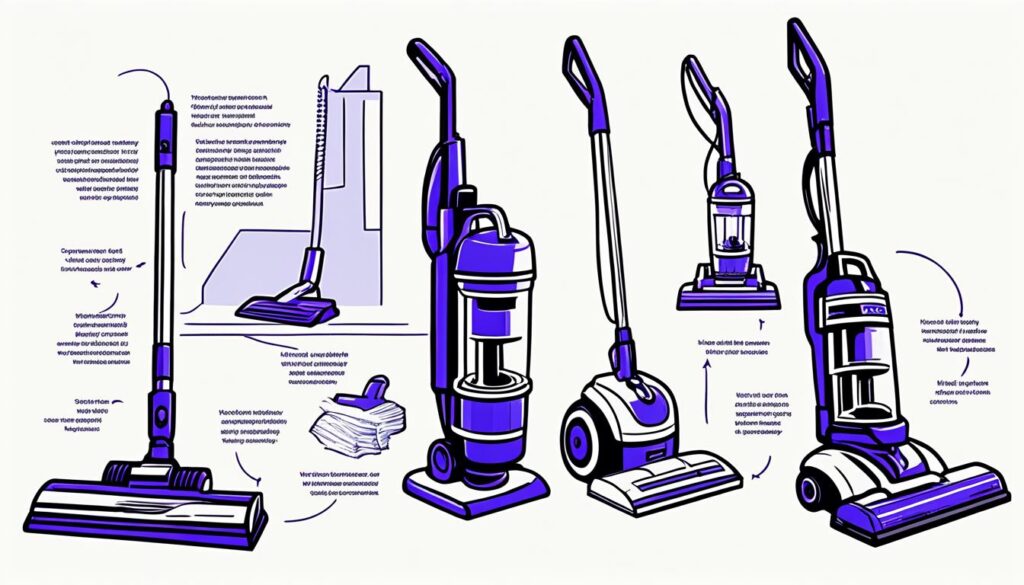
The Influence of Dyson in Vacuum Technology
A crucial player in the evolution of vacuum technology is Dyson, a renowned brand that has consistently introduced innovative features and revolutionized the cleaning industry15. James Dyson, the founder of Dyson vacuums, dedicated nearly 15 years to perfecting his vacuum designs, resulting in over 5,000 prototypes15. His relentless pursuit of excellence and commitment to innovation have made Dyson vacuums a household name worldwide15.
Dyson’s commitment to research and development is evident in their extensive investments and workforce. With over 5,000 engineers and scientists working on new products and technologies, Dyson spends a significant amount of money on research and development each week14. This emphasis on innovation has led to groundbreaking technologies, such as cyclonic separation, air purification, and solid-state batteries, all covered by Dyson’s numerous patents14.
Furthermore, Dyson has received recognition for its design excellence, winning over 200 design awards and 14 Red Dot Awards in 2020 alone14. Dyson’s commitment to sustainability is evident in their goal to become carbon-neutral by 2025, investing in technologies like solid-state batteries and electric motors14. These initiatives demonstrate Dyson’s continuous efforts to push the boundaries of vacuum technology while also prioritizing environmental responsibility14.
The James Dyson Foundation and Giving Back
James Dyson, through the James Dyson Foundation, has made significant contributions to charitable causes worldwide. The foundation has donated over 60 million pounds or 69 million euros to projects in 27 different countries16. By supporting education and scientific research, the James Dyson Foundation is actively nurturing the next generation of innovators16.
A Revolution in Lean Manufacturing
Dyson’s approach to lean manufacturing has revolutionized the industry of household and commercial appliances16. By streamlining production processes and reducing waste, Dyson has set new standards for efficiency and sustainability in the manufacturing sector16. This commitment to lean manufacturing allows Dyson to deliver high-quality products that are built to last16.
The Importance of Effective Vacuuming
Vacuuming is an essential part of maintaining cleanliness and hygiene in your home. Regular vacuuming helps remove dust, dirt, allergens, and pet hair from your floors and surfaces. This not only improves the appearance of your home but also contributes to a healthier living environment, especially for individuals with allergies or respiratory conditions.
When it comes to vacuuming, the importance of using an efficient and reliable vacuum cannot be overstated. Investing in a high-quality vacuum, such as a Dyson, offers several benefits for effective cleaning.
Powerful Suction for Thorough Cleaning
Dyson vacuums are known for their powerful suction, suitable for removing dirt, dust mites, and pet hair from various surfaces. Their innovative features, like “Root Cyclone” technology, ensure consistent suction power over time, allowing you to achieve a deep clean throughout your home17.
Designed for Long-Lasting Performance
Dyson vacuums are designed and built with durability in mind. On average, a well-maintained Dyson vacuum can last between 7 to 10 years, surpassing the average lifespan of other brands18. This longevity can be attributed to their high-quality construction and reliable motor, backed by a 20-year warranty on the motor17.
Versatility and Innovative Features
Dyson vacuums offer a wide range of attachments and features that set them apart from other brands. From specialized tools for pet hair removal to versatile designs that make cleaning convenient, Dyson vacuums provide the flexibility needed to tackle any cleaning task17. Their stick vacuums, in particular, offer a cordless design for added maneuverability and ease of use19.
Improved Indoor Air Quality
One of the key benefits of regular vacuuming is the removal of allergens and dust particles from the air. Dyson vacuums are equipped with HEPA filters that can trap up to 99.97% of particles as small as 0.3 microns, including pollen, dander, and dust mites19. This helps improve indoor air quality and creates a healthier living environment for you and your family.
To maintain the effectiveness and longevity of your Dyson vacuum, regular maintenance is crucial. Emptying the dust bin after each use, cleaning filters, and addressing any blockages or issues promptly can greatly enhance the machine’s performance and lifespan18. Additionally, using authorized service centers for repairs and following proper storage and usage practices contribute to maximizing the lifespan of your Dyson vacuum18.
By recognizing the importance of effective vacuuming and investing in a reliable and long-lasting vacuum like Dyson, you can achieve a cleaner, healthier, and more comfortable living space for you and your family.

Considering Your Vacuum’s Impact on Health and Environment
The choice of a vacuum can have a significant impact on both your health and the environment. By selecting the right vacuum, you can prioritize clean indoor air and contribute to sustainability efforts.
Vacuum Impact on Health
An essential factor to consider when choosing a vacuum is its impact on indoor air quality. Some vacuums are equipped with advanced filtration systems that can effectively capture allergens, dust, and pollutants, improving the air quality in your home. These vacuums can be particularly beneficial for individuals with allergies or respiratory conditions20.
By using a vacuum with a high-quality filtration system, you can reduce the presence of airborne particles, such as pet dander, pollen, and dust mites, creating a healthier environment for you and your family20.
Eco-Friendly Vacuum Options
In addition to considering their impact on health, it’s crucial to choose eco-friendly vacuum options that minimize harm to the environment. Some manufacturers produce vacuums made from recycled materials, reducing the demand for new resources20.
Moreover, energy-efficient vacuums can help lower your carbon footprint. Look for vacuums that are labeled as energy-efficient or those with features such as low wattage motors, which consume less electricity20.
Sustainable Vacuum Choices
To contribute to sustainable practices, it’s essential to choose vacuum options that promote longevity and reduce waste. Instead of discarding an entire vacuum, opt for repairing or replacing specific parts. This approach not only saves money but also extends the lifespan of the vacuum and prevents unnecessary waste20.
Furthermore, some vacuum manufacturers emphasize sustainability across their operations. For example, Dyson, a renowned brand in the industry, has initiatives in place to reduce their environmental impact. Dyson Farming, a subsidiary of Dyson, utilizes circular farming systems to generate renewable energy from crops20.
By making conscious choices and opting for sustainable vacuum options, you can prioritize both your health and the environment. Consider factors such as advanced filtration systems, the use of recycled materials, and the ability to repair or replace parts when selecting a vacuum. By doing so, you contribute to both a cleaner living environment and a more sustainable future20.

Next, let’s explore the lifespan of different types of vacuums and how long they typically last.
Conclusion
In conclusion, the lifespan of a Dyson vacuum can range from 8 to 12 years with proper maintenance. Dyson vacuums have a reputation for durability due to their use of high-quality materials in construction18. Regular maintenance can significantly enhance the performance and longevity of a Dyson vacuum18. Loss of suction is a common problem with Dyson vacuums, often attributed to blockages in hoses or filters18. Motor failure may require professional repair or replacement18. Issues with the rotating brush are usually caused by tangled hair or debris18. It is advisable to use authorized service centers for Dyson vacuum repairs18.
When considering the lifespan of a Dyson vacuum in relation to other brands, Dyson vacuums typically outlast competitors by a few years. While the average lifespan of a well-maintained Dyson vacuum is between 7 to 10 years, other vacuum cleaner brands in the market typically have an average lifespan of 5 to 8 years18. This showcases the durability of Dyson vacuums and their ability to withstand years of use.
Moreover, Dyson vacuum cleaners consistently receive high ratings for owner satisfaction and reliability compared to other vacuums on the market21. Dyson’s significant market presence is evident as they accounted for more than 20% of the global market share in the cordless vacuum cleaner sector in 2020, despite their high-end pricing21. Additionally, Dyson offers a comprehensive warranty program that covers all vacuum cleaner models for up to five years from the date of purchase, providing customers with peace of mind regarding their investment21.
When it comes time to replace your vacuum, it’s important to consider your specific needs and choose a reliable and efficient vacuum that aligns with those requirements. By selecting an appropriate vacuum for your home size and cleaning tasks, following manufacturer guidelines, and conducting regular maintenance, you can maximize the lifespan of your vacuum and enjoy a cleaner home for years to come2218.
